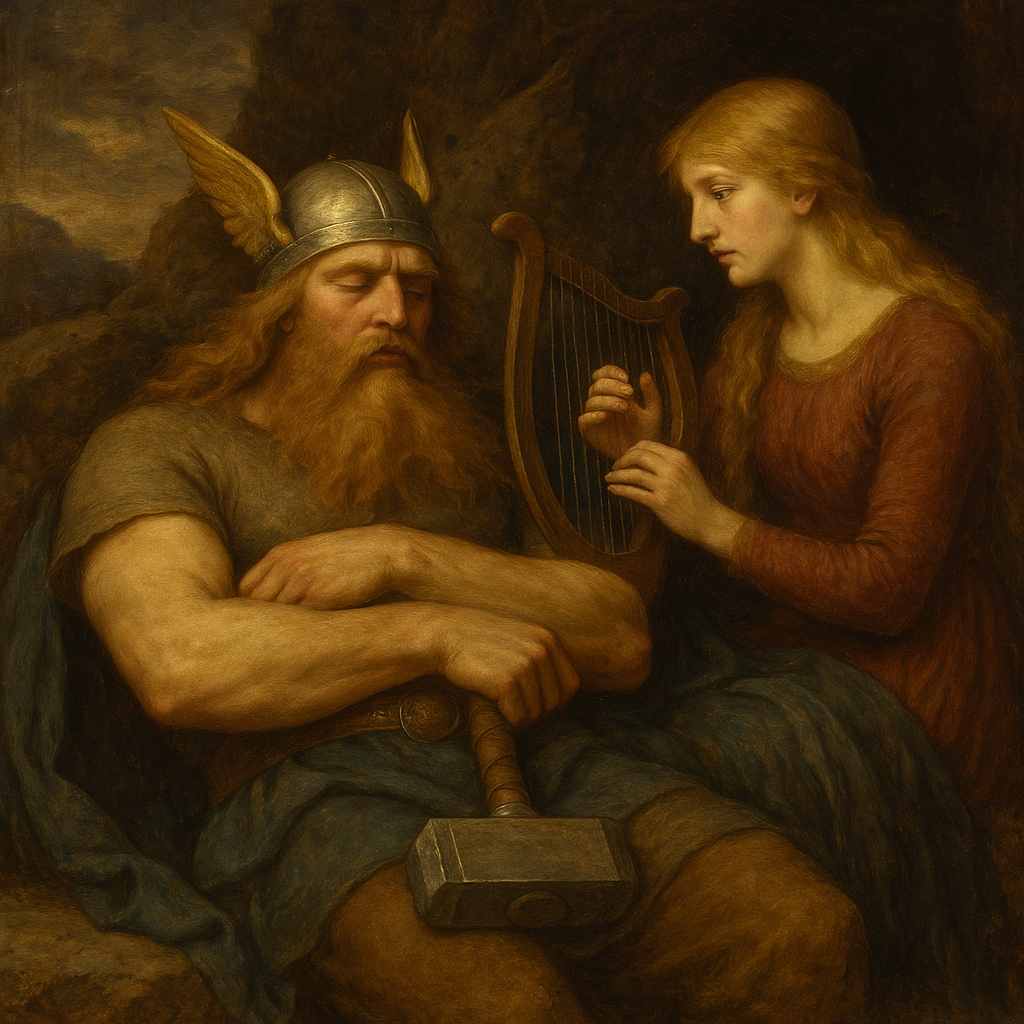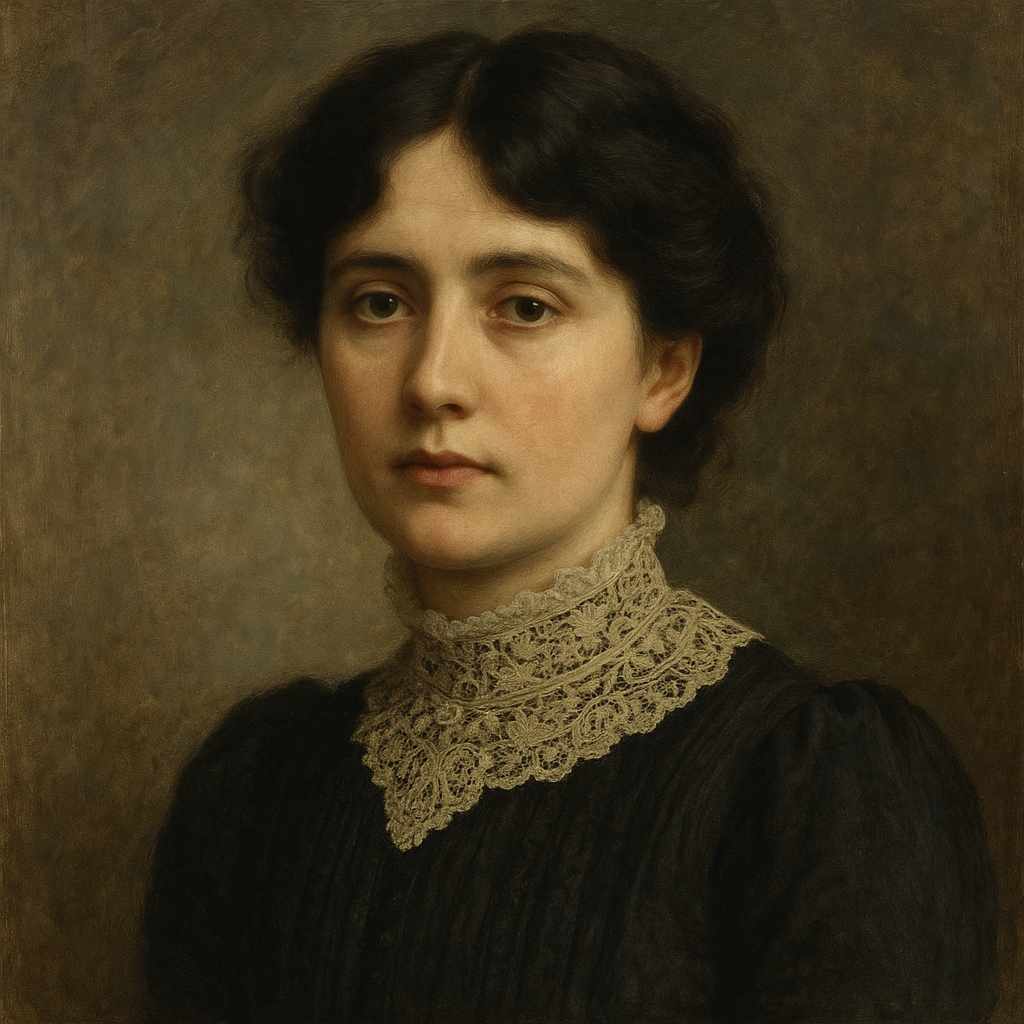Thor Asleep
Nora Hopper Chesson
1871 to 1906

Lord of the Plains of Trembling, Master of Bonds-men— Thor,
Where are you sleeping, son of Earth, while the men go down to the war?
Are the Giants slain and the Giants' Bane laid by, with its battles o'er?
Do you sit by Sif and listen, O Thor the Thunderer,
While she tunes her harp to a drowsy rhyme of woes and wars that were?
Are the swords and slings forgotten things for love of the songs of her?
Yet she is a God's own daughter, and the wild blood's in her, too —
She has watched the young lives spilling, and trodden them down like dew:
Does she not long for the seagull's song, and the ships in the midsea blue?
Awake, O Sif, arise, O Sif, and bid thy lord up-stand,
Draw close the belt about him, set Miolnir in his hand —
Bid him rise and smite for Odin's right and the sake of Odin's land.
For over the sleep of Bragi the fearless wild bees hum,
And Frigga listens at her loom for steps that never come:
And an ended story is Odin's glory, and the mouth of Mimir's dumb.
Up, Thor, for Odin's honour: up, Sif, for the Thunderer's!
Tho' Sigurd sleep at Brynhild's side, let sleep be his and hers!
Open tho' late is Valhall gate, and the sleeping fire it stirs.
Sing, Sif, till the heroes hear thee — and rise, and northward go
Till the Warder wakes on Bifrost bridge and Balder wakes below;
Till the Warder wakes and the sunrise breaks the frozen heart of the snow.
Sing, Sif, till the ears of Odin hear thee, until Hel's door
Be opened wide for Balder, and Frigga's watch be o'er —
Sing, Gold-Hair, sing until Glasir ring with the steps of Tyr and Thor.
Nora Hopper Chesson's Thor Asleep
Nora Hopper Chesson’s Thor Asleep is a haunting and evocative poem that reimagines Norse mythology through a lens of melancholy and urgency. Written in the late 19th or early 20th century, the poem engages with themes of divine abandonment, the passage of time, and the tension between love and duty. Chesson, an Irish poet deeply influenced by Celtic and Norse mythologies, crafts a work that is both a lament and a call to action, blending lyricism with epic grandeur.
This essay will explore the historical and cultural context of Thor Asleep, its literary devices, central themes, and emotional resonance. Additionally, we will consider its place within the broader tradition of mythological revivalism in poetry, drawing comparisons where relevant to other works of the period.
Historical and Cultural Context
The Victorian and Celtic Revivalist Fascination with Norse Myth
Chesson’s work emerges from a period of intense interest in Norse mythology, particularly among British and Irish writers. The late 19th century saw a surge in translations of Old Norse sagas, most notably through the efforts of scholars like Eiríkr Magnússon and William Morris. Poets such as Matthew Arnold (Balder Dead) and Alfred, Lord Tennyson (The Voyage of Maeldune) also engaged with Norse themes, blending them with Romantic and Victorian sensibilities.
Chesson, however, brings a distinct Celtic sensibility to her treatment of Norse myth. As an Irish writer, she was part of the Celtic Revival, a movement that sought to reclaim and reimagine indigenous folklore and legend. Her portrayal of Thor and Sif is imbued with a lyrical melancholy reminiscent of Irish bardic traditions, where gods and heroes often exist in a liminal space between myth and memory.
The Poem’s Mythological Framework
Thor Asleep draws primarily from the Prose Edda and Poetic Edda, key sources of Norse mythology. The poem references:
-
Thor, the god of thunder, traditionally a protector of humanity against giants.
-
Sif, his wife, known for her golden hair (here depicted as a harpist).
-
Odin, the Allfather, whose "glory" is described as an "ended story."
-
Balder, the beloved god whose death presages Ragnarök.
-
Mimir, the wise being whose decapitated head Odin consults.
The poem’s central conceit—that Thor is inactive while the world decays—subverts traditional Norse narratives, where Thor is a relentless defender of Asgard. Instead, Chesson presents a world where the gods have grown passive, their power waning. This reflects a broader fin-de-siècle anxiety about cultural and spiritual decline, a theme prevalent in late Victorian literature.
Literary Devices and Structure
Imagery and Symbolism
Chesson employs rich, sensory imagery to evoke a mythic world suspended between action and stasis:
-
Sleep and Silence: The repeated motif of sleep ("Thor the Thunderer" dozing, "Bragi the fearless" lulled by bees, Odin’s "ended story") suggests a suspension of divine will. The gods, once dynamic, are now passive observers.
-
Music and Song: Sif’s harp symbolizes both beauty and escapism. Her music is initially a "drowsy rhyme," lulling Thor into inaction, but later becomes a rallying cry ("Sing, Sif, till the heroes hear thee").
-
Frozen Landscapes: The "frozen heart of the snow" and "Hel’s door" suggest a world in winter, awaiting renewal—an allusion to the Norse myth of Fimbulwinter preceding Ragnarök.
Allusion and Intertextuality
Chesson’s references to Norse myth are not mere decoration; they deepen the poem’s thematic concerns. For instance:
-
Balder’s Absence: His death in myth triggers Ragnarök, and his return (implied in "till Balder wakes below") symbolizes hope.
-
Mimir’s Silence: Mimir’s wisdom is inaccessible, suggesting a loss of divine guidance.
-
Valhall’s Closed Gate: Valhalla, the hall of slain warriors, is dormant, implying that heroism itself has faded.
These allusions create a layered reading experience, where the poem functions both as mythic narrative and allegory for cultural stagnation.
Rhetorical Devices
-
Apostrophe: The speaker directly addresses Thor and Sif ("Awake, O Sif, arise, O Sif"), heightening urgency.
-
Anaphora: Repetition of "Sing, Sif" and "till" builds rhythmic momentum, mirroring the call to action.
-
Paradox: "An ended story is Odin’s glory" suggests that even mythic legacies fade, a poignant commentary on forgotten traditions.
Themes
Divine Abandonment and Human Vulnerability
The poem’s central tension lies in Thor’s inaction. Traditionally, Thor is humanity’s protector; his slumber leaves mortals vulnerable. This reflects a broader existential anxiety: if the gods no longer intervene, what happens to those who depend on them? The "men go[ing] down to the war" may symbolize human struggles unfolding without divine aid—a theme resonant in post-Enlightenment literature, where faith in providence wanes.
The Power of Art and Memory
Sif’s harp initially lulls Thor into complacency, but later, her song becomes a catalyst for awakening. This duality suggests that art can both soothe and incite. Chesson, writing during the Celtic Revival, may be arguing for the role of poetry and music in cultural renewal—a call to "sing" myths back to life.
Cycles of Decline and Renewal
The poem’s closing lines—"till the sunrise breaks the frozen heart of the snow"—suggest hope. Like the Norse myth of cyclical destruction and rebirth, Chesson implies that even dormant powers can reawaken. This aligns with Victorian-era fascination with rebirth, seen in works like Tennyson’s Idylls of the King and Swinburne’s Atalanta in Calydon.
Emotional Impact
Thor Asleep balances elegy with exhortation. The languid beauty of Sif’s music contrasts with the desperate plea for Thor’s return, creating a poignant tension. Readers familiar with Norse myth may feel the weight of loss—Balder’s death, Odin’s silence—while also anticipating renewal.
Chesson’s lyrical style enhances this emotional complexity. Lines like "the wild blood’s in her, too" and "the sleeping fire it stirs" evoke both ferocity and tenderness, capturing the duality of mythic figures who are both divine and deeply human.
Comparative Analysis
Chesson and William Morris
William Morris’ Sigurd the Volsung (1876) similarly reworks Norse legend, but where Morris emphasizes heroic action, Chesson focuses on inertia. Both, however, share a Romantic belief in myth’s regenerative power.
Celtic Parallels: W.B. Yeats
Yeats’ The Wanderings of Oisin (1889) also depicts a mythic hero in stasis. Like Thor, Oisin returns to find his world changed, underscoring themes of temporal dislocation. Both poets use myth to explore cultural memory.
Conclusion
Thor Asleep is a masterful synthesis of mythic grandeur and intimate lyricism. Chesson reimagines Norse gods not as distant archetypes but as figures burdened by time, love, and duty. The poem’s power lies in its duality—it is both a lament for lost glory and a rallying cry for revival.
In an era where traditional beliefs were being supplanted by modernity, Chesson’s work suggests that myths are not dead but dormant, waiting for the right song to stir them. This message resonates beyond its Victorian context, speaking to any age where cultural memory teeters on the edge of oblivion. Through Thor Asleep, Chesson reminds us that even the gods need awakening—and sometimes, poetry is the spell that rouses them.
This text was generated by AI and is for reference only. Learn more
Want to join the discussion? Reopen or create a unique username to comment. No personal details required!



Comments
No comments yet. Be the first to comment!